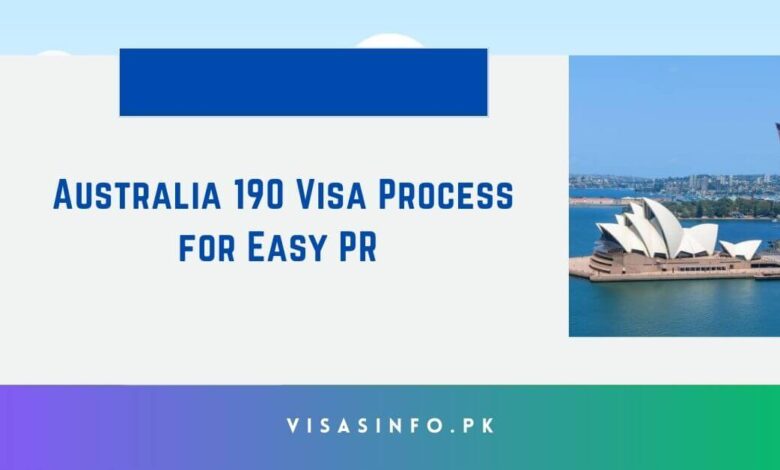Australia 190 Visa Process for Easy PR 2024

The Subclass 190 Skilled Nominated Visa is a permanent residency visa that is sponsored by the state and is available to skilled laborers and their immediate family members. This Visa differs from the Subclass 189 Visa in that the applicant must satisfy all occupational requirements for the state in question, submit an Expression of Interest to the state, and provide all necessary documentation.
Additionally, you have the option of setting the default to any state to broaden your options, as each state has a distinct state nomination program with implementations that vary significantly. The points-based Skilled Nomination Visa is the optimal option for you if you are interested in permanently residing and working in Australia and your occupation is in high demand in a specific state or territory, but you do not meet the requirements for a skilled independent visa.
This update will provide you with comprehensive guidance on both the streamlined application process and the comprehensive nomination process.
What is the process for receiving nominations?
To be eligible for a nomination for a Subclass 190 Visa, you must submit an Expression of Interest through Skill Select. Upon completion, the state and territory governments will have the opportunity to review your EOI and determine whether to nominate you. The administrations of those states or territories may designate you if your field of work is in demand.
You are not required to obtain a nomination from a state or territory government before submitting your Expression of Interest. The ability to promptly modify the information in your Expression of Interest following a nomination will increase your likelihood of being invited to apply for a skilled nomination Visa Subclass 190.
State and territory migration plans typically contain a list of occupations that a state or territory government may recommend. Nomination typically occurs when you indicate during the talent selection procedure that you would like to be nominated by a state or territory.
What is the process for applying?
The Subclass 190 visa application process is comprised of numerous stages.
- Initially, you must be nominated by a government agency in an Australian state or territory.
- The evaluating authority will subsequently furnish you with a skills assessment report, which must be submitted with your visa application.
- To submit an Expression of Interest, it is necessary to utilize the Skill Select system. Your Expression of Interest will be accessible to state and territory governments, who may subsequently nominate you for a visa if they wish.
- Furthermore, you will have up to sixty days from the date of your invitation to apply for a visa to submit a comprehensive application and all necessary supporting materials.
- Finally, you will be able to submit all necessary documents, including your skills assessment report, your English language board results, your character exam records, and your health and identity verification, to proceed with the visa application.
- Which Occupation List is available to you?
- This visa is available to individuals whose occupations are listed on the short-term skilled occupation list or the medium- and long-term strategic skills list. A distinct set of duties is present in each list, the majority of which are immediately apparent from their titles. Occasionally, there may be certain positions that are more difficult to categorize.
- In this case, it will be necessary to examine the tasks that have been enumerated and locate the specific A-Z. Your English proficiency and age are among the numerous variables that contribute to your score. If you apply for this form of visa, you will receive an additional five points for your state nomination.
- The processing period for Subclass 190 visas is contingent upon the volume of applications received by the Department of Home Affairs. The processing of a Subclass 190 Visa application typically requires six to twelve months. Nevertheless, this schedule may be extended if additional information is required or if the processing process takes longer than expected.
- After receiving your 190 visa application, a case officer may conduct identification checks and evaluate the information you have provided, including employment, character, and health, before deciding whether to grant it. It is important to be aware that a case officer may reject your visa application without requesting any additional information or supporting documentation.
The New Limit for International Students in Australia
Students are in for some unfortunate news: Australia may soon implement a limit on international enrollment. This update will address the potential limit for prospective Australian students.
Check Also: Australia Upcoming Visa Changes
Government Strategies and Growing Speculation
While enforcing its immigration laws, the Australian government may limit the number of foreign students. This encompasses reports that assert that new regulations would impose taxes on international students, as indicated by the interim report of the Australian University’s Accord. The majority of colleges reject this concept as a result of the conflicting reactions it elicits.
Benefits of Australia 190 Visa Process for Easy PR
- Permanent Residency: The 190 Visa provides permanent residency, enabling individuals to reside, work, and study in Australia indefinitely.
- State Nomination: This visa necessitates nomination by an Australian state or territory, which can simplify the application process by indicating that the applicant’s talents are frequently in demand in that region.
- Pathway to Citizenship: Permanent residency is a prerequisite for Australian citizenship. 190 visa holders are eligible to file for citizenship once they have fulfilled the residency requirements.
- Benefits Accessibility: Permanent residents are entitled to Medicare, which is Australia’s public health system, as well as social security benefits and public education.
- Family Inclusion: The 190 Visa permits the inclusion of family members in the application, thereby granting them the same rights and benefits as the primary visa holder.
- Work Rights: The Australian labor market is unrestricted in terms of the type of work and the number of hours you can work, granting you complete access.
- Skilled Workers Pathway: The visa is intended for skilled workers who possess qualifications and experience in occupations that are in high demand in Australia, thereby simplifying the process of obtaining permanent residency for those with highly sought-after skills.
- State-Based Support: State and territory administrations frequently offer 190 visa holders supplementary support and incentives, such as job search support or assistance with settling in the region.
- Increased Points: The likelihood of receiving an invitation to apply for the visa can be enhanced by the receipt of a state nomination, which can result in the accumulation of additional points toward the General Skilled Migration (GSM) points test.
- Travel Flexibility: Permanent residency enables visa holders to travel freely in and out of Australia, and they can remain in the country while awaiting citizenship approval.
- Regional Benefits: The 190 Visa may provide opportunities for additional benefits and support to encourage settlement and development if nominated by a regional area.
Present Situation and Proposals
By the midpoint of 2023, there were more than 590,000 foreign students enrolled in Australian universities, with 568,753 of them possessing valid visas. To generate revenue and discourage enrollment in low-value courses, the Grattan Institute increased the cost of student visas as an alternative to levies. Nevertheless, there are apprehensions that the increased fees would impede the enrollment of students from lower socioeconomic backgrounds in specific institutions.
Industry Response and International Comparisons
In comparison to this, the Canadian policy of restricting student visas in Australia is currently as follows. This levy is opposed by the Student Accommodation Council, which demonstrates that the housing crisis is prioritized over the recruitment of global talent. They recommend that the focus be on purpose-built student housing to reduce housing demands.
In opposition to the proposed tax
The Independent Tertiary Education Council Australia (ITECA) has requested that the government oppose the proposed tax due to the numerous concerns it raises regarding the potential harm to Australia’s international reputation.
Education Sector Competitiveness
They argue that the implementation of such a tax will result in an increase in the cost of education in Australia, which will discourage a significant number of international students from enrolling. Additionally, they believe that it will harm the education sector. A variety of responses have been elicited by Australia’s contemplation of imposing special tariffs and a cap on the number of overseas students. The stakeholders underscore the significance of striking a balance between the affordability of education and the scarcity of accommodation to attract international talent. This is a critical matter in terms of Australia’s educational reputation.
Frequently Asked Questions:
-
How long does it take to get the 190 visa grant in Australia?
The approximate processing time for a skilled nominated visa (Subclass 190) is 6.5 to 8 months.
-
How do I get PR quickly?
completes within six months. However, after receiving an ITA for a PR Visa, the average time taken is around five to eight months.
-
Is Australia giving PR easily?
Acquiring an Australian PR visa is not that difficult, provided that you meet the eligibility requirements and score good points according to the Australian PR points system.



